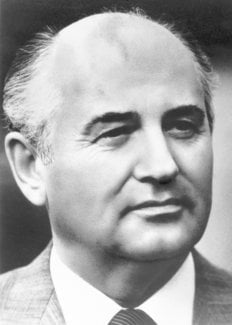Mikhail Gorbachev
Biographical

1931: March 2, born, Privolnoye, Krasnogvardeisky District, Stavropol territory in the North Caucasus, to a peasant family in a small village, his father an agricultural mechanic on a collective farm.
1942: German army occupies the Privolnoye area.
1945: Begins work as assistant to combine harvest operator.
1949: Awarded Order of Red Banner of Labour.
1950: Enrolled in Faculty of Law, Moscow University.
1952: After having been a member of Komsomol (Communist Youth Organisation), now joined the Communist Party of the Soviet Union (CPSU).
1955: Marries Raisa Maximovna Titorenko, philosophy student. Receives degree in law.
1955-60: Appointed First Secretary, Komsomol Territorial Committee, then moves up to higher posts, finally becoming top Komsomol official in Stavropol.
1956: Daughter Irina born.
1961: Delegate from Stavropol to 22nd Communist Party Congress in Moscow.
1962: Appointed to key position in Stavropol Communist Party, responsible for personnel in administration, farms and industry.
1964-67: Studies for second degree at Stavropol Agricultural Institute.
1970: Appointed First Secretary for Stavropol territory, governing an area of 2.4 million people.
1971: Member CPSU Central Committee.
1978: Moves to Moscow as Secretary of Agriculture in Central Committee.
1980: Becomes youngest full member of Politburo.
1985: March, Elected by Central Committee as General Secretary of CPSU.
1989: Elected by new parliament as Executive President of Soviet Union.
1991: August, abortive coup of hardliners, resigns as General Secretary of CPSU, dissolves Central Committee.
1991: December 25, resigns as President when Soviet Union disintegrates.
1992: Head of Foundation for Social, Economic and Political Research, think-tank founded after August coup.
Selected bibliography
By Gorbachev
Memoirs. Translated from the Russian by Georges Peronansky and Tatjana. New York: Doubleday, 1996.
The August Coup: The Truth and the Lessons. New York: Harper Collins, 1991.
Perestroika. New Thinking for Our Country and the World. New York: Harper, 1988. (New updated edition. An explanation and a manifesto, with five chapters on foreign policy. Published in many languages.)
Other sources
Billington, James H. Russia Transformed: Breakthrough to Hope. Moscow, August 1991. (An important interpretation, based on personal observation of the August coup and a lifetime of study of Russia.)
Brown, Archie. The Gorbachev Factor. Oxford: Oxford University Press, 1996. (An important scholarly study by a major authority on Gorbachev.)
Doder, Dusko and Louise Branson. Gorbachev: Heretic in the Kremlin. (By wellinformed American journalists.)
Medvedev, Zhores A. Gorbachev. Oxford: Blackwell, 1986. (By a Soviet scientist, living in London.)
Gorbachev, Raisa. I Hope: Reminiscences and Reflections. New York: Harper Collins, 1991.
Kaiser, Robert G. Why Gorbachev Happened: His Triumphs and his Failures. New York: Simon & Schuster, 1991.
Miller, John. Mikhail Gorbachev and the End of Soviet Power London: Macmillan, 1993. (Scholarly.)
Remnick, David. Lenin’s Tomb: The Last Days of the Soviet Empire. New York, 1993. (Perceptive journalistic account.)
Smith, Hedrick. The New Russians. New York: Random House, 1990. (A leading interpreter of the Russian people returns to describe them in the time of great change.)
This autobiography/biography was written at the time of the award and first published in the book series Les Prix Nobel. It was later edited and republished in Nobel Lectures. To cite this document, always state the source as shown above.
Mikhail Gorbachev died on 30 August 2022.
Nobel Prizes and laureates
Six prizes were awarded for achievements that have conferred the greatest benefit to humankind. The 12 laureates' work and discoveries range from proteins' structures and machine learning to fighting for a world free of nuclear weapons.
See them all presented here.
